BATTLEFIELD EARTH (2000)
It's the year 3000 A.D and humanity is enslaved by gold-thirsty alien tyrants, who are unaware their 'man-animals' are about to rebel.
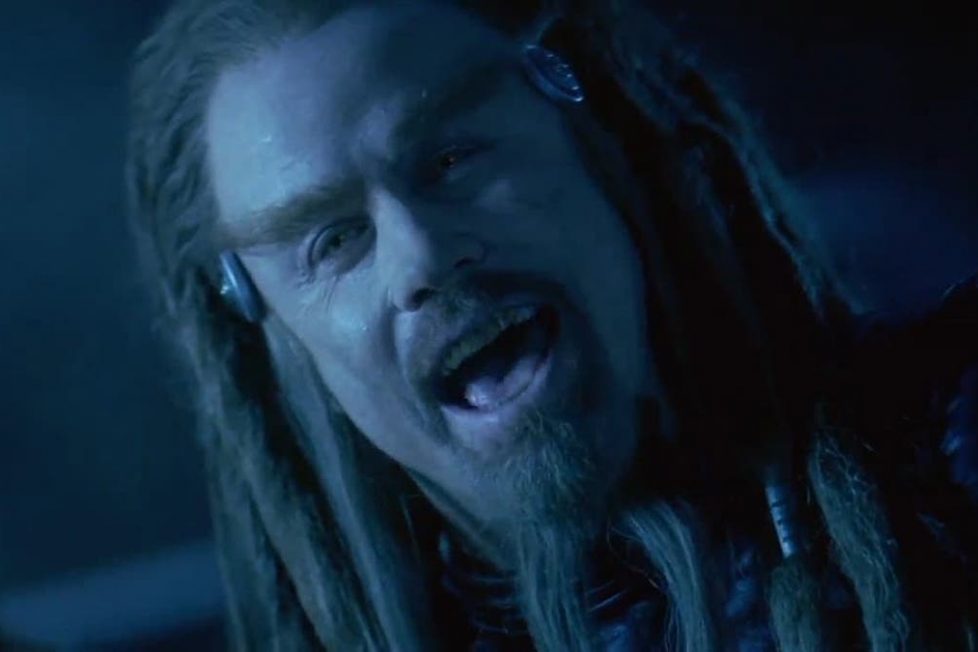
It's the year 3000 A.D and humanity is enslaved by gold-thirsty alien tyrants, who are unaware their 'man-animals' are about to rebel.


Along with his confused look around from Pulp Fiction (1994), John Travolta is most often lauded online for his delivery of the line “while you were still learning how to spell your name, I was being trained to conquer galaxies!” That moment alone places Battlefield Earth among the pantheon of ‘so bad it’s good’ cinema, but unlike The Room (2003) that quote is a rare moment of schadenfreude in an otherwise terrible bad movie.
Battlefield Earth: A Saga of the Year 3000, as it’s sometimes referred to, takes place after the thousand-year oppression of the alien Psychlos who have enslaved a near-extinct human race to mine gold for their own planet. Vicious commander Terl (Travolta) spies potential in rebellious Jonnie (Barry Pepper) to lead his experiment in teaching regressed mankind to use alien tech in order to steal resources from under his superior’s noses, while Jonnie exploits this conflict in alien bureaucracy to stage a revolution. It’s an almost decent narrative that gets shredded by ineptitude.
Travolta had sought to adapt the 1982 novel by author L. Ron Hubbard for so long that he aged out of his favoured role as Jonnie. Studios never wanted to fund the project for concerns over the script and Hubbard’s link to Scientology as its founder, with Travolta one of the controversial religion’s best-known celebrity devotees. While there are some allegorical allusions to political viewpoints in the novel, it’s safe to assume these studios just didn’t want to produce an awful screenplay.
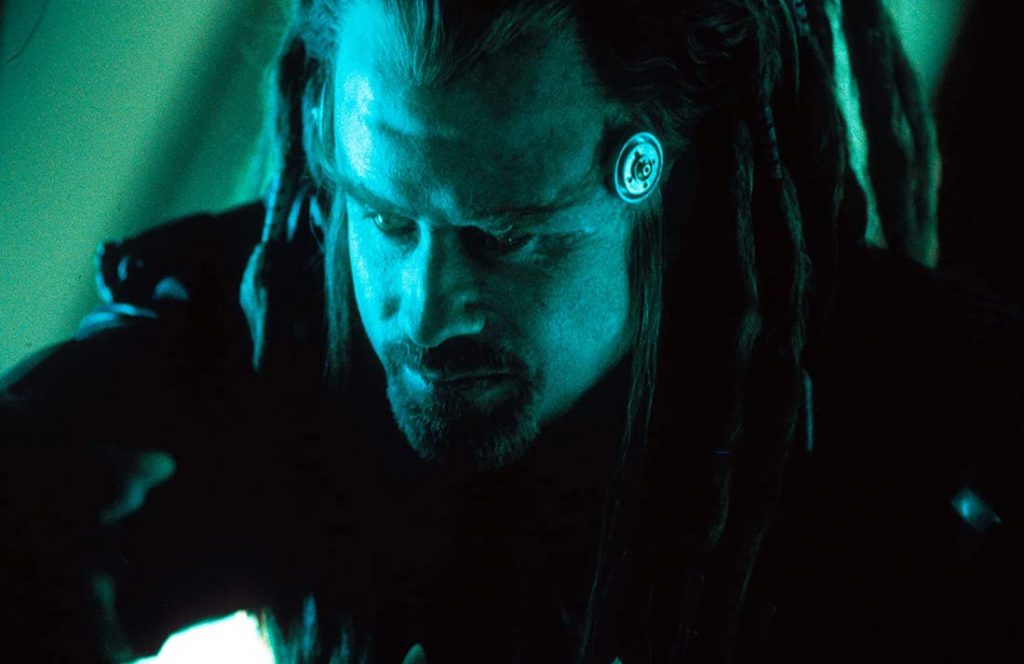
The idea of adapting the book began as early as Hubbard suggesting his own involvement immediately after publishing, saying “I’ve recently written three screenplays, and some interest has been expressed in Battlefield Earth, so I suppose I’ll be right back in Hollywood one of these days”. Despite his only directing experience being Scientology training films, Hubbard was set to make a film duology costing $30M. A nationwide contest promoting an all-expenses-paid trip for a walk-on part was created as marketing, along with a 30-foot inflatable of Terl appearing in Hollywood Boulevard! This was 1984, just two years before Hubbard died, so he never knew it would take well over a decade to finally start production.
In 1998, independent company Franchise Pictures, aided by Travolta’s personal millions, made production on Battlefield Earth official, keeping Hubbard’s concept of a two-part saga. A quick look at Franchise’s history shows largely negative reactions because of their reputation for rescuing pet projects; this and Ballistic: Ecks vs. Sever (2002) are now considered two of the worst films of all time. Gnawing anxiety perhaps plagued screenwriter J.D Shapiro (Robin Hood: Men In Tights) in condensing a 1000-page novel into a coherent motion picture, heightened by the mostly negative reviews the book received upon publication! These ranged from “atrociously written, windy and out of control” to “wholly populated by the most one-dimensional of cardboard characters”. Neil Gaiman recommends it, however, so make of that what you will…
The creative team assembled gave hope. Director Roger Christian was also the production designer for every single Star Wars at that point, winning an Academy Award for his work, as well as a nomination for Alien (1979). Having directed The Sender (1982), before directing the Second Unit on Star Wars: Return of the Jedi (1983) and Star Wars: Episode I – The Phantom Menace (1999), George Lucas himself recommend Christian to Travolta to take charge of the film.
Here’s a quote from BAFTA-nominated cinematographer Giles Nuttgens which does my job for me:
… one of the things that we came up with that a lot of people will find disturbing at first is that everything is at a dutch angle, there is not a level frame in the film.
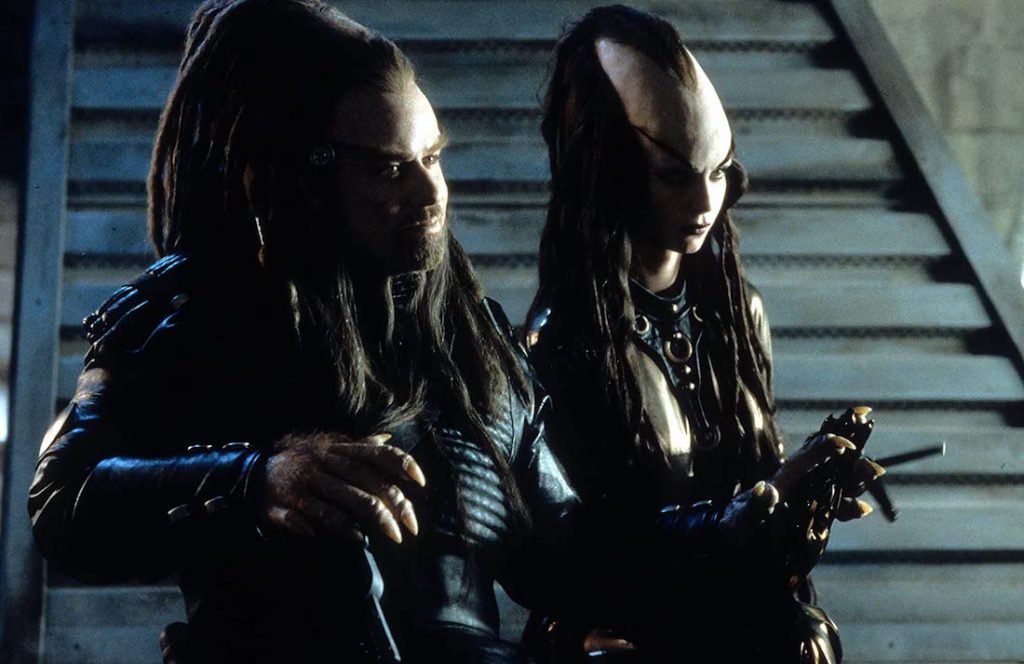
I would use the word nauseating. Christian’s direction is abysmal to a near-unwatchable degree, turning action sequences into gauntlets of endurance. The lack of choreography is apparent in the frenetic cutting of close-up scuffles and dull slow-motion running, bolstered by an inexplicable loss of diegetic sound for a dreary soundscape that puts you to sleep. The most egregious error is that the whole intimidation of the Psychlos is their 9-foot physical presence, done with platform-booted costumes, and yet the incompetent directing hides this with few establishing shots and every conversation shot at a canted angle.
Further putting his foot in his mouth, Nuttgens said:
I think when the audience go to see Battlefield Earth, they will be surprised by the concentration of the look of the film. It’s colour, it’s texture, it is a really, really different looking film.
There is an effort from the creative team with some impressive miniature cities and generally serviceable SFX, but for a British director, Christian must’ve known that Doctor Who had sometimes looked higher budget than this production. Most of the narrative takes place in human gulags and mining operations and it genuinely feels as if half was shot in a quarry.
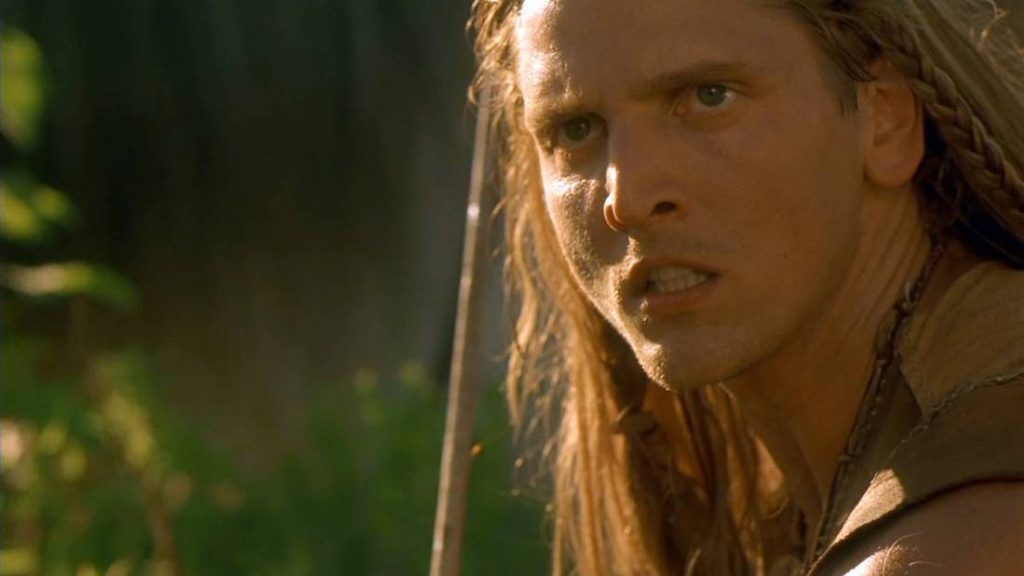
The absence of spectacle can’t be ignored when the film attempts to lift wholesale from genre classics like Blade Runner (1982) and Star Wars (1977). Narratively, the closest similarity is The Planet of the Apes (1968), as both first acts deal with a language barrier causing imbalances in society. But even with literal apes, we learnt their classist nuances and begrudging tolerance shifts whereas the Psychlos are generic Klingon-style baddies, and even Star Trek: The Next Generation had course-corrected that simplicity since the 1980s.
The protagonist gets no fanfare, there’s barely a soundtrack, and Barry Pepper is stuck performing all the archetypal destined hero steps with no chance to emote. Their truncated equivalent of Luke Skywalker’s relatives being burnt alive is a literal three-second transition shot of Jonnie over his father’s grave, a motivation on par with the love interest who appears in maybe four scenes. The language dynamic in Apes is enticing because we wait for Charlton Heston’s vocal injury to heal before he can intellectually lash out against his oppressors… whereas Jonnie and his kin are just dumbasses. Luke’s naïve but he at least knows about the Empire and the Rebellion (a shifting worldview), but here we feel at least ten steps ahead and grow tired waiting for the characters to catch up.
And then there’s Travolta. We’ve seen how ridiculous his performance can be, but the casting is inherently embarrassing because no amount of prosthetics can disguise the fact it’s just John Travolta with dreadlocks. Even his co-star Forrest Whittaker at least feels somewhat in-character, but Travolta doesn’t come across as alien whatsoever and looks like he belongs at a Star Trek convention. The only actor to give a decent performance is ever-dependable Kim Coates, avoiding any cringe-worthy moments and providing the one ‘good’ scene during the climactic battle.
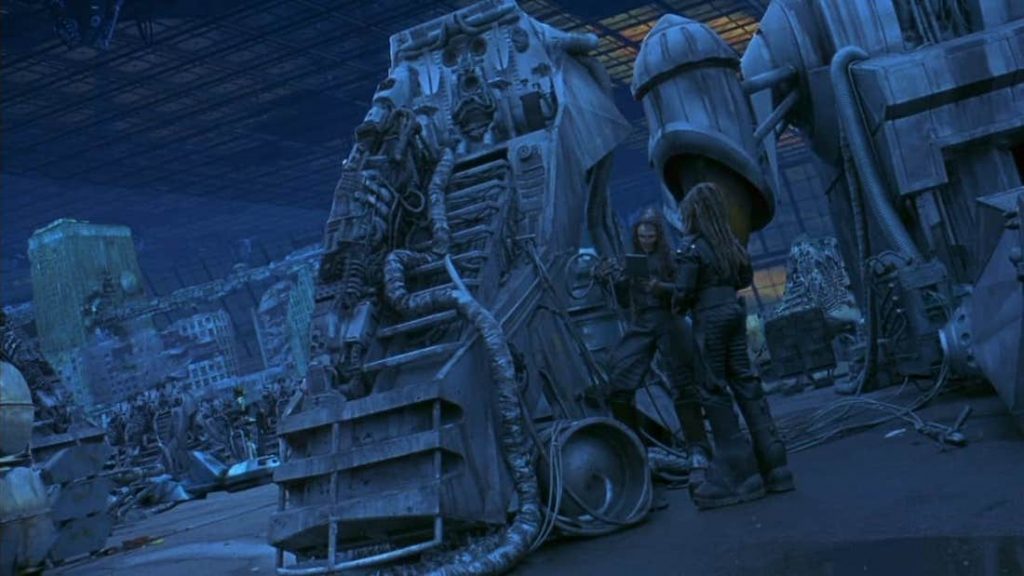
But Travolta’s trademark cadence isn’t the only baffling experience when viewing Battlefield Earth, it’s trying to comprehend the tone. Obviously, all involved wanted this to be the next Star Wars but coming hot-on-the-heels of The Phantom Menace, Christian must have believed alongside Lucas that the Jar Jar Binks-style humour would mesh well with an operatic space epic. The “spell your name” dialogue comes from the reprimanded Terl drinking his troubles away in an alien bar after being condemned to many more years of working on this hated planet. It all feels like a sketch Robot Chicken would do, where Darth Vader is perhaps made to serve on Tattooine by the Emperor… and we know how he hates that sand!
For the entire runtime, it’s indiscernible whether we’re supposed to laugh with Travolta, at him, or even at all. Doing a little research into the novel, I learned that Psychlos have brain implants to make hard labour enjoyable and extreme sadism in any lesser beings attempting to equal them… but without this crucial revelation, it’s Travolta that comes across as psychotic rather than his character.
Once the film gets going the second act is marginally engaging and the third act provides an entertaining hit of uninspired dog-fighting warfare. Any early subtleties of language and intelligence becoming the defining factor in conflict is lost when wild-men move from using sticks and stones to piloting fighter jets, and the thematic overtones of subjugation are answered with nuclear genocide. If there’s any Kubrickian irony towards war here, I don’t hear Vera Lynn playing over the credits.
As if it needs saying, Battlefield Earth, much like its source material, was met with widespread derision. But while Hubbard’s book achieved some commercial success thanks to aggressive in-house Scientology campaigns, there was no saving this movie. With a $73M budget, the massively underwhelming box-office only brought just under $30M, which even lead to lawsuits from investors as the now-bankrupt Franchise Pictures fraudulently overstated their budget by $31M. There ends a production saga that’s more interesting than the finished movie itself. And in case you’re still wondering… no, Travolta did not get to make part two!

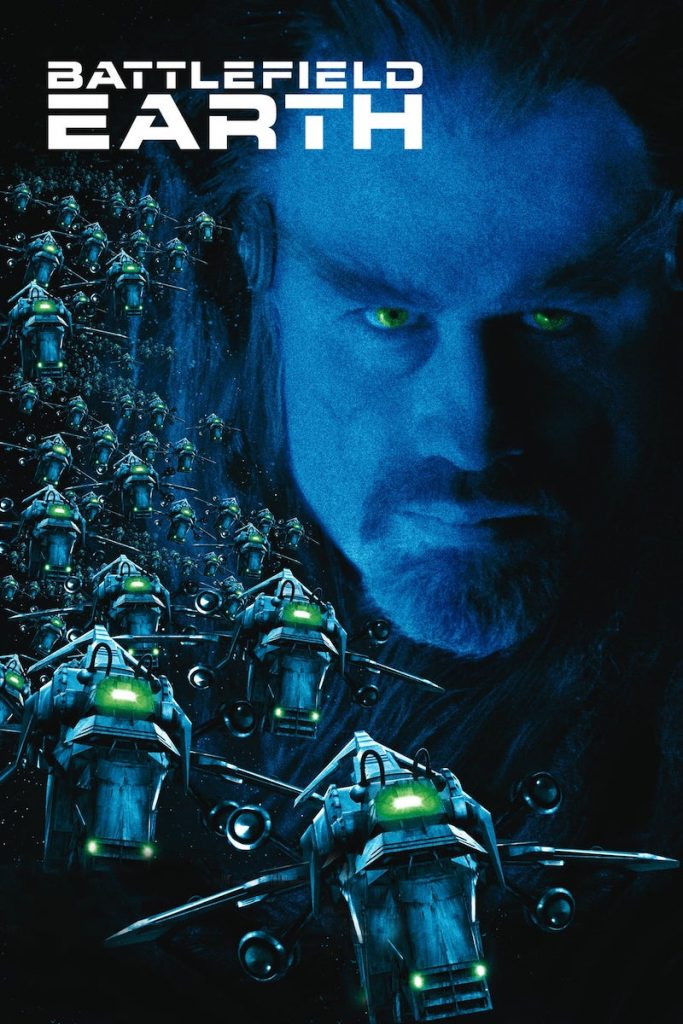
director: Roger Christian.
writers: J.D Shapiro & Corey Mandell (based on the novel by L. Ron Hubbard).
starring: John Travolta, Barry Pepper, Forest Whitaker, Kim Coates, Richard Tyson & Sabine Karsenti.
